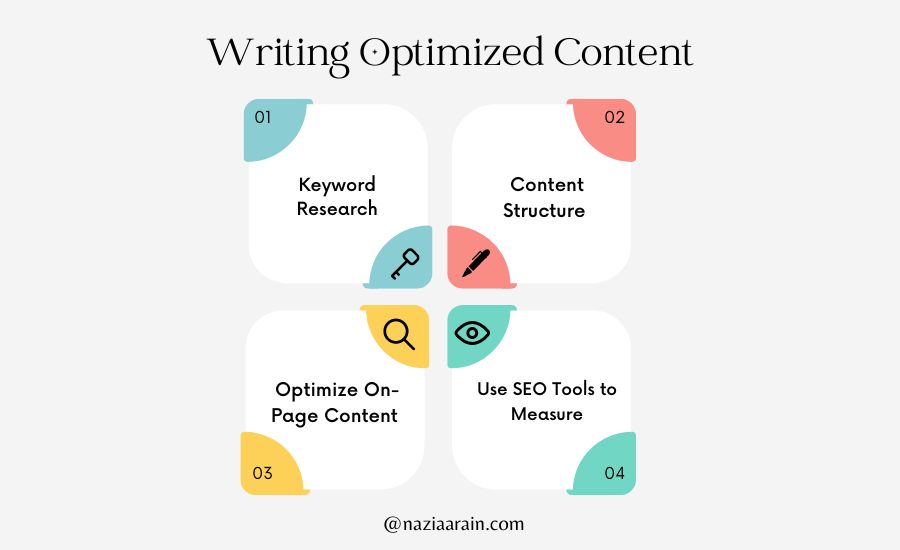Blog - August 8, 2023
How to Write Optimized Content for SEO | 2023 Guide for Good Practices

In 2023, writing optimized content for SEO is essential for any website looking to rank higher in search engines and attract more organic traffic. With so many websites and online content available today, it can be challenging to stand out from the crowd. However, by creating high-quality, optimized content that meets the needs of both search engines and readers, you can improve your website’s ranking and drive more traffic.
In this article, we’ll discuss how to write optimized content considering SEO factors in 2023. We’ll cover the basics of search engine optimization, including keyword research, on-page optimization, and content structure. By the end of this article, you’ll better understand how to create content that ranks well in search engines and appeals to your target audience.
Table of Contents
How to write Optimized Content?

Search engine optimization (SEO) writing is crafting text with top search engine results pages (SERPS) in mind. One way to accomplish this is to conduct keyword analysis and optimize content to address the user’s goals directly.
Google, for instance, employs “spiders” to explore websites and analyze their content. The language used on the page provides a wealth of information throughout this crawl.
Search engine optimization (SEO) writing improves a page’s readability and, thus, its ranking in search engine results. It moves up the search engine results page when it has a higher rating.
The text may not come off as search engine friendly, and the crawlers may have trouble understanding what the page is about if SEO writing wasn’t used in its creation.
Suggested Reads: Google Ranking Factors to Rank # 1
Understand Search Engine Optimization
Before you start writing content, it’s crucial to understand the basics of search engine optimization (SEO). SEO is optimizing your website’s content and structure to rank higher in search engine results pages (SERPs). By optimizing your content for SEO, you can improve your website’s visibility and attract more organic traffic.
Conduct Keyword Research
Keyword research is a critical aspect of SEO. It involves identifying the words and phrases people use to search for information related to your website or industry. Using the right keywords in your content can increase your chances of ranking higher in search results for those keywords.
When conducting keyword research, identify the primary topics and themes related to your website. Use keyword research tools like Google Keyword Planner, SEMrush, or Ahrefs to identify keywords related to those topics. Look for keywords with high search volume and low competition.
Use Keywords Strategically
Once you’ve identified your target keywords, it’s essential to use them strategically in your content. This means including them in your title, headings, and body content. However, it’s essential to use keywords naturally and not overdo them. Overusing keywords can result in keyword stuffing, hurting your website’s ranking.
In addition to using keywords strategically, including related terms and synonyms in your content is crucial. This helps search engines understand the context of your content and can improve your website’s ranking for associated keywords.
Optimize Your On-Page Content
On-page optimization refers to optimizing the content on your website’s pages to rank higher in search results. This includes optimizing your title tags, meta descriptions, headers, and body content.
When optimizing your on-page content, it’s important to keep your target audience in mind. Write engaging and relevant content for your target audience while also strategically including keywords.
Write Engaging Headlines and Subheadings
Headlines and subheadings are essential for both readers and search engines. They help readers understand the structure of your content and find the information they’re looking for quickly. They also help search engines understand the context of your content and improve your website’s ranking for related keywords.
When writing headlines and subheadings, be clear and concise. Use descriptive words and include your target keywords where appropriate. However, it’s important to avoid clickbait headlines that misrepresent your content.
Structure Your Content Properly
The structure of your content is crucial for both readers and search engines. Structured content is easier to read and understand, making it more engaging for readers. It also helps search engines understand the context of your content and improve your website’s ranking.
When structuring your content, use a clear and logical hierarchy. Start with an introduction that clearly defines the topic of your content, followed by headings and subheadings that break the content into manageable sections. Use bullet points and numbered lists to make your content more scannable and easy to read.
Optimize Your Images and Media
Images and other media can enhance your content and make it more engaging for readers. However, it’s important to optimize your images and media for SEO. This means including alt text that describes the content of your images and using descriptive filenames.
Using descriptive filenames and alt text can help search engines understand the context of your images and improve your website’s ranking for related keywords. It also makes your content more accessible for users who may be using screen readers or have slow internet connections.
Measure and Analyze Your Results
Measuring and analyzing your SEO results is essential for improving your website’s ranking and driving more organic traffic. Use tools like Google Analytics, SEMrush, or Ahrefs to track your website’s traffic, keyword rankings, and other important metrics.
Analyze your results regularly and make adjustments to your content and SEO strategy as needed. This can help you identify what’s working and what’s not and make data-driven decisions to improve your website’s ranking and drive more traffic.
Conclusion
In 2023, writing optimized content for SEO is essential for any website looking to improve its ranking and attract more organic traffic. By conducting keyword research, using keywords strategically, optimizing your on-page content, and building high-quality links, you can improve your website’s visibility and appeal to your target audience.
Remember to focus on creating high-quality, engaging content that meets the needs of both search engines and readers. Measure and analyze your results regularly and adjust as needed to improve your website’s ranking and drive more traffic.
FAQs:
Is keyword density still important for SEO in 2023?
Keyword density is less important for SEO in 2023 than it used to be. Instead, focus on using keywords strategically and naturally in your content.
How long should my content be for SEO purposes?
There is no set length for SEO content. However, longer content tends to perform better in search results and can help establish your website as an authority on a topic.
What is the best way to build high-quality links to my website?
The best way to build high-quality links to your website is by creating valuable, engaging content that other websites and influencers in your industry want to share. Participating in guest blogging opportunities can also help build links to your website.
Should I focus on on-page optimization or off-page optimization for SEO?
Both on-page and off-page optimization are essential for SEO. On-page optimization helps search engines understand the content of your website, while off-page optimization helps establish your website’s authority and credibility.
Leave a comments